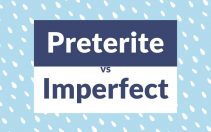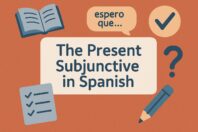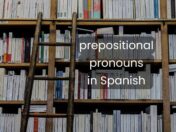5 Mistakes in Spanish That Even Advanced Students Make (Part 2)

Get our free email course, Shortcut to Conversational.
Have conversations faster, understand people when they speak fast, and other tested tips to learn faster.
More infoBack by popular demand, in this post, we will list the most common mistakes in Spanish that even advanced students make.
In case you missed it, here is part one on the same topic (you can read that one later).
If you are a beginner or intermediate student, then we recommend reading the below posts first.
- Mistakes that most beginner Spanish students make.
- Mistakes that intermediate Spanish students make (part 1).
- Mistakes that intermediate Spanish students make (part 2).
And now, back to our original topic for this post: 5 Spanish mistakes that advanced students tend to make.
¡vamos!
1) Mixing up “Interested” and “Interesting”
I know that this one sounds very simple.
And you’re right – it is simple, yet I often see intermediate and advanced students slip up and confuse these two when trying to express interested (interesado/interesada), or interesting (interesante).
Let’s clarify how to use both.
As you can see, we use Interesado or Interesada to express “interested”
The most important rule to remember is that to express “interested”, you’ll ALWAYS use this formula:
- Estar verb conjugated + interesado(a) + en…
Pretty simple, isn’t it?
Let’s see some examples:
- Marta is interested in taking cooking classes – Marta está interesada en tomar clases de cocina
- The students were not interested in knowing the results of the test – Lo estudiantes no estaban interesados en saber los resultados de la prueba
- Sarah is only interested in boys and clothes – Sara solo está interesada en los chicos y la ropa
- I’m really interested in the new Italian course – Estoy realmente interesado en el nuevo curso de italiano
(ps, in the last example, we changed the formula slightly to include an adverb of manner (really/realmente) which in this case, helps us intensify or emphasize our interest)
You may be wondering what happens if I use the verb Ser (instead of Estar) with interesado/a?
Well, it completely changes the context.
For example, if you were to say “eres un interesado/a”, it would mean that the person you are talking to is self-interested.
Let’s see some more examples:
- You are self interested, you’re only with me because of my money – Eres una interesada, solo estas conmigo por mi dinero.
- Why are you so self interested? You only talk to her when you want something from her – ¿Por qué eres tan interesado? Solo le hablas cuando quieres algo de ella.
Now, you should know how to express being interested.
It’s time to quickly review how to say that something is interesting (interesante).
Generally, we use one of the following formulas:
- Ser verb conjugated + interesante
- Noun + interesante
Here are some examples:
- The movie was interesting for the entire three hours – La película fue interesante a lo largo de las tres horas
- I’m reading an interesting book about the WW2 – Estoy leyendo un libro interesante sobre la Segunda Guerra Mundial
- I think that white sharks documentary has been really interesting – Me parece que el documental sobre los tiburones blancos ha sido muy interesante
- What’s your opinion about the new Chemistry? Interesting or boring? – ¿Qué piensas sobre la nueva clase de Química? ¿Es interesante o aburrida?
2) Not Using Direct and Indirect Speech
Mastering the use of Direct and Indirect speech is an important step in beginning to sound like a competent Spanish speaker..
Every single sentence you repeat, or paraphrase will either be in direct or Indirect speech.
Let’s have a quick overview of each:
Direct Speech is very simple, since it repeats the exact words of the original speaker, using quotation marks.
For example:
- I’m very tired today / Daniela says: “I’m very tired today” – Estoy muy cansada hoy / Daniela dice: “Estoy muy cansada hoy”
Indirect Speech is a bit trickier since it requires modifying the sentence, and repeating the original speaker’s words without quotes in a subordinate clause (introduced by que).
For example:
- I want my book back / Pablo says (that) he wants his book back – Quiero mi libro de vuelta / Pablo dice que quiere su libro de regreso.
Now that you know the difference between direct and indirect speech, we can see some examples of how to switch between both, depending on which tense you are speaking in.
| Direct | Indirect | Example |
| Present Simple | Present Simple | Frank: I’m hungry / Frank says he is hungry
Frank: Tengo hambre / Frank dice que tiene hambre |
| Simple Past | Past Perfect Tense | Frank: I bought a bike yesterday / Frank said he’d bought a bike yesterday
Frank: Ayer compré una bicicleta / Frank dijo que había comprado una bicicleta |
| Future Simple | Conditional Simple (would) | Frank: I will arrive late / Frank said he would arrive late
Frank: Llegaré tarde / Frank dijo que llegaría tarde |
| Imperfect | Imperfect | Frank: The house was very beautiful / Frank said the house was very beautiful
Frank: La casa era muy bonita / Frank dijo que la casa era muy bonita |
| Conditional Simple (would) | Conditional Simple (would) | Frank: I would like to eat pizza / Frank said he would like to eat pizza
Frank: Me gustaría comer pizza / Frank dijo que le gustaría comer pizza |
| Past Perfect tense | Past Perfect tense | Frank: She had already arrived at 3 / Frank said she had already arrived at 3
Frank: A las 3 ella ya había llegado – Frank dijo que ella a las 3 ya había llegado |
Before we wrap up this point, we should mention a category of verbs known as “reporting verbs”.
These are verbs that are commonly used to introduce somebody’s words, either in quotes (direct speech), or by paraphrasing (indirect speech).
| Reporting Verb | English Equivalent | Example |
| Decir | To tell | He told to me he had to go to the university – Me dijo que tenía que ir a la universidad |
| Preguntar | To ask | She asked him if he could go to the reunion – Le preguntó si podía ir a la reunión |
| Querer saber | To want to know | Juan wanted to know if I could take him to the science museum – Juan quería saber si yo podía llevarlo al museo de ciencias |
| Pedir | To ask for | He asked me for bringing his painkiller – Me pidió que le trajera su calmante |
| Contestar | To answer | He answered that he didn’t know what to do – Contestó que no sabía qué hacer |
| Comentar | To comment | They commented that they were very thrilled – Comentaron que estaban muy emocionados |
| Confesar | To confess | Alicia confessed to her boyfriend that she had gone out with another man – Alicia le confesó a su novio que había salido con otro hombre |
| Prometer | To promise | You promised me you would do the laundry tomorrow – Me prometiste que lavarías la ropa mañana |
| Quejarse | To complain | The children complained that they didn’t have any food – Los niños se quejaron que no tenían nada de comida |
| Recordar | To remind | They reminded us that the party started at 8:00pm – Nos recordaron que la fiesta empezaba a las 8 de la noche |
3) Confusing Active vs Passive Voice
Knowing how to switch between the active voice and passive voice is easier than it sounds.
Both in Spanish and in English, we use the active voice to emphasize who or what is carrying out the action.
For example:
- I repaired that TV last night – Yo reparé ese televisor anoche
- My little brother is watching the football match on ESPN – Mi hermanito está viendo el partido de fútbol por ESPN
The active voice is generally more commonly used than the passive.
However, the passive voice is used when we want to emphasize the action itself, and sometimes we’ll even exclude the who or what carrying out the action.
For example:
- The TV was repaired by me last night – El televisor fue reparado por mí anoche
- The football match is being watched on ESPN by my little brother – El partido de fútbol está siendo visto en ESPN por mi hermanito
You’ll notice that the direct objects in active voice (the TV and the football match) are now the subjects the passive voice.
How do you form the Passive Voice?
While it may initially be confusing for some students, once you stick to the below formula, forming the passive voice is relatively straight forward.
All you need to do is use:
- subject + verb “ser” conjugated + past participle of main verb + by (optional)
For example:
- The Spanish language is spoken by approximately 559 millions of people – El español es hablado por 559 millones de personas aproximadamente
Once you know this formula, you need to remember the following.
The passive voice always requires you to conjugate the verb “ser”, and that conjugation is always in the same tense as the main verb in the active sentence.
Pro tip: Don’t forget the accent on mí when it comes after a preposition.“Mi” (no accent) means “my,” while “mí” (with accent) means “me.”
Let’s see how this works with different Spanish tenses.
(the passive voice is in bold)
| Tense | Spanish | English |
| Simple Present | Yo veo la película – La película es vista (por mí) | I watch the movie – The movie is watched (by me) |
| Simple Past | Ví la película – La película fue vista (por mí) | I watched the movie – The movie was watched (by me) |
| Simple Future | Veré la película – La película será vista (por mí) | I will watch the movie – The movie will be watched (by me) |
| Present Perfect | He visto la película – La película ha sido vista (por mí) | I have watched the movie – The movie has been watched (por mi) |
| Past Perfect Tense | Había visto la película – La película había sido vista (por mí) | I had watched the movie – The movie had been watched (por mi) |
One last rule to remember – the past participle must always agree with the gender and number of the subject.
For example:
- I don’t eat pizza / pizza is not eaten by me – Yo no como pizza / la pizza no es comida por mí
- He doesn’t eat arepas / Arepas are not eaten by him – Él no come arepas / Las arepas no son comidas por él
- They are watching Shakira’s videos / Shakira’s videos are being watched by them Ellos están viendo videos de Shakira – Los videos de Shakira están siendo vistos por ellos
4) Conditional Compound 3
I have to admit, this one can be a bit tricky,
In Spanish, we use the Conditional Compound 3 to talk about a situation that did not happen in the past, but has imaginary or hypothetical consequences.
This conditional is formed by using the Past Perfect Subjunctive. (also called the Pluperfect Subjunctive or Pretérito Pluscuamperfecto de Subjuntivo).
To form the conditional compound, you need to use the below formula:
- If + pluperfect subjunctive + past participle + “haber” in the conditional form + past participle
For example:
- If Marta had studied medicine, she would have been a famous doctor – Si Marta hubiera estudiado medicina, habría sido una doctora famosa
Hopefully, you’ll agree that it’s not too confusing once we see the concept in action.
To form the conditional compound, you must know the following conjugations:
| Past Perfect Subjunctive (Pretérito Pluscuamperfecto de Subjuntivo) | ||
| Personal Pronoun | Conjugation “have” (haber) | English Equivalent |
| Yo | Hubiera/se | I had |
| Tú | Hubieras/ses | you had |
| Él/ ella/usted/eso | Hubiera/se | he/she/it had |
| Nosotros/nosotras | Hubiéramos/semos | we had |
| Ellos/ellas/ustedes | Hubieran/sen | they had |
| Perfect Conditional (Condicional Perfecto) | ||
| Personal Pronoun | Conditional form “have” (haber) | English Equivalent |
| Yo | habría | I would have |
| Tú | habrías | you would have |
| Él/ella/usted/eso | habría | he/she/it would have |
| Nosotros/nosotras | habríamos | we would have |
| Ellos/ellas/ustedes | habrían | they would have |
Here are some examples using both structures in the same sentence:
- If I had known that, I would have cancelled my reservation. – Si yo hubiese/ra sabido eso, habría cancelado mi reservación.
- If I had slept more yesterday, I would not have been tired the entire day. – Si yo hubiese/ra dormido más, no habría estado cansado todo el día.
- If you had talked to us first, we would have supported you. – Si hubieras/ses hablado con nosotros primero, te habríamos apoyado.
5) Using “Hubo” or “Hubieron?”
Just like other languages, there are certain rules in Spanish that are not exactly logical.
Sometimes this happens due to colloquial differences, and other times, it’s just something quirky in the language.
(and many rules have exceptions, which we’ll cover later on)
An odd rule in Spanish that students regularly confuse is related to the use of the verb haber in the plural form.
Let’s say that you want to say “there were” or “there was” in the simple past tense.
It makes perfect sense to use hubieron, right?
Yes, that makes sense.
But it wouldn’t be correct.
The verb haber (to have) is often called an “impersonal” verb — meaning it doesn’t have a subject and is always conjugated in the third-person singular.
That’s true, but there’s a deeper reason behind it.
When haber is used to mean “there is / there are” (hay, hubo, habrá, etc.), it’s actually a transitive verb, and the noun that follows it is the direct object, not the subject.
Because there’s no subject, the verb doesn’t change according to number.
This means that when speaking in the past tense, we need to use the third person singular “hubo” when we want to say “there was” or “there were”, even if the subject is plural.
Below are some examples, including both correct and incorrect versions.
- There were too many people at the baseball game – Hubieron demasiadas personas en el juego de béisbol (incorrect)
- There were some technical problems with the new equipment – Hubieron algunos problemas técnicos con los nuevos equipos (incorrect)
- There were too many people at the baseball game – Hubo demasiadas personas en el juego de béisbol (correct)
- There were some technical problems with the new equipment – Hubo algunos problemas técnicos con los nuevos equipos (correct)
As we alluded to, Spanish language rules are full of exceptions, and this one is no different.
Haber in the plural CAN be used when combined with a past participle, though it’s not super common, especially in real-life conversations.
The formula is simple:
- Haber + Pasado Participio.
The above formula unlocks a tense called “preterito anterior” which is used to indicate an action that took place directly before another action in the past.
While it’s good to be aware of this, you don’t need to worry about knowing the concept very well.
In fact, the conjugation is so obscure that most native speakers aren’t 100% sure about how and when should they use it, so the only place where you are likely to come across it is in old Spanish literature.
Let’s see this conjugation in the following chart
| Personal Pronoun | Haber (Pretérito Anterior) | Past Participle: Ser (to be) | English Equivalent |
| Yo | hube | sido | I had been |
| Tú | hubiste | sido | You had been |
| Él/ella/usted/eso | hubo | sido | He/she/it had been |
| Nosotros/nosotras | hubimos | sido | We had been |
| Ellos/ellas/ustedes | hubieron | sido | They had been |
As I said, this concept is not super common, so don’t fret over it too much.
In fact, you’ll normally find the Pretérito Pluscuamperfecto (Past Perfect) being used in its place for regular speech nowadays.
Before finishing this point, I’ll leave you with some examples of the Pretérito Anterior and Pretérito Pluscuamperfecto.
- When they had finished all their homework, they could go out to play – Cuando todos hubieron terminado sus deberes, pudieron salir a jugar (Pretérito Anterior) / Cuando todos habían terminado sus deberes, pudieron salir a jugar (Pretérito Pluscuamperfecto)
- Once they had gone out, they closed the door – Una vez que hubieron salido, cerraron la puerta (Pretérito Anterior) / Una vez que habían salido, cerraron la puerta (Pretérito Pluscuamperfecto)
One final point on the above tenses, is that both tend to be introduced by linking words such as: cuando, tan pronto como, una vez que, después (de) que, hasta que, luego que, así que, no bien, apenas.
Ok, we just covered a ton of information in this post.
Don’t worry if you can’t get your ahead around all 5 points at once.
In fact, we recommend bookmarking this page and coming back to it every now and then.
Advanced Mistakes in Spanish: Exercises
If you’re still with us, then feel free to complete the below exercises on the topics covered in this post.
(scroll below for the answers)
1. Choose the correct option between Interested and Interesting
- Claudia parece estar muy (interesada/interesante) en las clases de Yoga
- Las estudiantes de intercambio estaban (interesados/interesantes) en aprender español en poco tiempo
- La película es un fiasco. El argumento y los diálogos no son para nada (interesantes/interesados)
- Mi jefe me recomendó el último libro de Stephen King, y es realmente (interesante/interesado)
- Mis hermanos y yo estábamos muy emocionados e (interesados/interesantes) en practicar Kitesurfing, pero después nos dimos cuenta que el Skateboarding es un deporte más (interesado/interesante)
2. Transform each sentence into Direct and Indirect Speech
- Helena: “¡Estoy enferma!”
- Carlos: iNo quiero ir a trabajar hoy!”
- Mi esposa: “¿Te gustaría ir al cine hoy?
- El profesor: ¿Cuál fue resultado del problema?
- Mi papá: “La casa era gigantesca y tenía una piscina olímpica ”
3. Change every sentence from Passive to Active voice
- Cientos de videos en YouTube son vistos diariamente por millones de personas
- El gato fue encontrado dentro del sótano por los bomberos
- Las canciones de Guns and Roses han sido escuchadas por miles de fanáticos alrededor del mundo
- El guión de la obra es escrito por un famoso guionista del Reino Unido.
- El mensaje fue enviado a todos los trabajadores por la jefe de Recursos Humanos
4. Complete each sentence with the correct conjugation in Conditional Compound 3
- Si yo (haber) ____ (comer) ____ menos, yo (haber) ____ (bajar) ____ de peso
- Si ellos (haber) ____ (ir) ____ más temprano, no (haber) ____ (perder) ____ el tren a Madrid
- Si Claudia no (haber) ____ (saber) ____ la respuesta, no (haber) ____ (poder) ____ aprobar el examen
- Si mi jefe no me (haber) ____ (aumentar) ____ el sueldo, no (haber) ____ (comprar) ____ mi nueva casa en la playa
- Si el gato no (haber) ____ (pelear) ____ con el perro, él (haber) ____ (estar) vivo ahora
5. Fill the blanks by using: Haber
- _____ varias personas heridas en el accidente de ayer
- En el exámen de la semana pasada solo _____ un estudiante que lo aprobó
- Muchas personas no pudieron entrar al concierto porque no _____ suficientes boletos a la venta
- Según el artículo, _____ muchos accidentes de tráfico en la ciudad de Bogotá durante el 2017
- Todos los invitados fueron vestidos de negro. Pero _____ una excepción con una mujer que usaba un elegante vestido verde
- La comida en ese restaurante fue tan buena, que no ____ ni una persona quejándose del mal servicio
Advanced Mistakes in Spanish: Answers
1. Choose the correct option between: Interested and Interesting
- Claudia parece estar muy interesada en las clases de Yoga
- Las estudiantes de intercambio estaban interesados en aprender español en poco tiempo
- La película es un fiasco. El argumento y los diálogos no son para nada interesantes
- Mi jefe me recomendó el último libro de Stephen King, y es realmente interesante
- Mis hermanos y yo estábamos muy emocionados e interesados en practicar Kitesurfing, pero después nos dimos cuenta que el Skateboarding es un deporte más interesante y con menos riesgo
2. Transform each sentence into Direct and Indirect Speech
- Helena dijo: “¡Estoy enferma!”- Helena dice que está enferma
- Carlos dice: “¡No quiero ir a trabajar hoy! – Carlos dice que no quiere ir a trabajar hoy
- Mi esposa me pregunta: “¿Te gustaría ir al cine hoy?” – Mi esposa me preguntó si me gustaría ir al cine hoy
- El profesor me preguntó: “¿Cuál es el resultado del problema?” – El profesor me preguntó que cuál había sido el resultado del problema
- Mi papá me dijo: “La casa era gigantesca y tenía una piscina olímpica”- Mi papá me dijo que la casa era gigantesca y tenía piscina olímpica
3. Change every sentence from Passive to Active voice
- Millones de personas ven diariamente cientos de vídeos en YouTube
- Los bomberos encontraron al gato dentro del sótano
- Miles de fanáticos alrededor del mundo han escuchado las canciones de Guns and Roses
- Un famoso guionista del Reino Unido escribe el guión para la obra
- El jefe de Recursos Humanos envió el mensaje a todos los trabajadores
4. Complete each sentence with the correct conjugation in Conditional Compound 3
- Si yo hubiera comido menos, yo habría bajado de peso
- Si ellos hubieran ido más temprano, no habrían perdido el tren a Madrid
- Si Claudia no hubiera sabido la respuesta, no habría podido aprobar el examen
- Si mi jefe no me hubiera aumentado el sueldo, no habría comprado mi nueva casa en la playa
- Si el gato no hubiera peleado con el perro, él habría estado vivo ahora
5. Fill the blanks by using: Haber
- Hubo varias personas heridas en el accidente de ayer
- En el exámen de la semana pasada solo hubo un estudiante que lo aprobó
- Muchas personas no pudieron entrar al concierto porque no hubo suficientes boletos a la venta
- Según el artículo, hubo muchos accidentes de tráfico en la ciudad de Bogotá durante el 2017
- Todos los invitados fueron vestidos de negro. Pero hubo una excepción con una mujer que usaba un elegante vestido verde
- La comida en ese restaurante fue tan buena, que no hubo ni una persona quejándose del mal servicio



